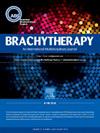Instant plan quality prediction on transrectal ultrasound for high-dose-rate prostate brachytherapy
IF 1.7
4区 医学
Q4 ONCOLOGY
引用次数: 0
Abstract
PURPOSE
We investigated the feasibility of AI to provide an instant feedback of the potential plan quality based on live needle placement, and before planning is initiated.
MATERIALS AND METHODS
We utilized YOLOv8 to perform automatic organ segmentation and needle detection on 2D transrectal ultrasound images. The segmentation and detection results for each patient were then fed into a plan quality prediction model based on ResNet101. Its outputs are values of selected dose volume metrics. Imaging and plan data from 504 prostate HDR boost patients (456 for training, 24 for validation, and 24 for testing) treated in our clinic were included in this study. The segmentation, needle detection, and prediction results were compared to the clinical results (ground truth).
RESULTS
For prediction model, the p-values of t-test between the predicted values and ground truth for either rectum D2cc or urethra D20% were larger than 0.8. The sensitivity of prediction model in finding implant geometries resulting in below-median rectum D2cc and urethra D20% were 83% and 87%.
CONCLUSION
The proposed method has great potential to facilitate the current prostate HDR brachytherapy workflows by providing valuable feedback during needle insertion, and facilitating decision making of where and if additional needles are required.
通过经直肠超声预测高剂量率前列腺近距离放射治疗的即时计划质量。
目的:我们研究了人工智能的可行性,它能在计划开始前,根据实时置针情况即时反馈潜在计划的质量:我们利用 YOLOv8 对二维经直肠超声图像进行自动器官分割和针检测。然后将每位患者的分割和检测结果输入基于 ResNet101 的计划质量预测模型。其输出是选定的剂量体积指标值。本研究包括本诊所治疗的 504 名前列腺 HDR 提升患者(456 名用于训练,24 名用于验证,24 名用于测试)的成像和计划数据。将分割、针检测和预测结果与临床结果(地面实况)进行了比较:结果:对于预测模型,直肠 D2cc 或尿道 D20% 的预测值与地面实况之间的 t 检验 p 值均大于 0.8。预测模型在找到导致直肠 D2cc 和尿道 D20% 低于中线的种植体几何形状方面的灵敏度分别为 83% 和 87%:所提出的方法在前列腺 HDR 近距离放射治疗工作流程中大有可为,它能在穿刺针插入过程中提供有价值的反馈,并有助于决定在何处以及是否需要额外的穿刺针。
本文章由计算机程序翻译,如有差异,请以英文原文为准。
求助全文
约1分钟内获得全文
求助全文
来源期刊

Brachytherapy
医学-核医学
CiteScore
3.40
自引率
21.10%
发文量
119
审稿时长
9.1 weeks
期刊介绍:
Brachytherapy is an international and multidisciplinary journal that publishes original peer-reviewed articles and selected reviews on the techniques and clinical applications of interstitial and intracavitary radiation in the management of cancers. Laboratory and experimental research relevant to clinical practice is also included. Related disciplines include medical physics, medical oncology, and radiation oncology and radiology. Brachytherapy publishes technical advances, original articles, reviews, and point/counterpoint on controversial issues. Original articles that address any aspect of brachytherapy are invited. Letters to the Editor-in-Chief are encouraged.
 求助内容:
求助内容: 应助结果提醒方式:
应助结果提醒方式:


